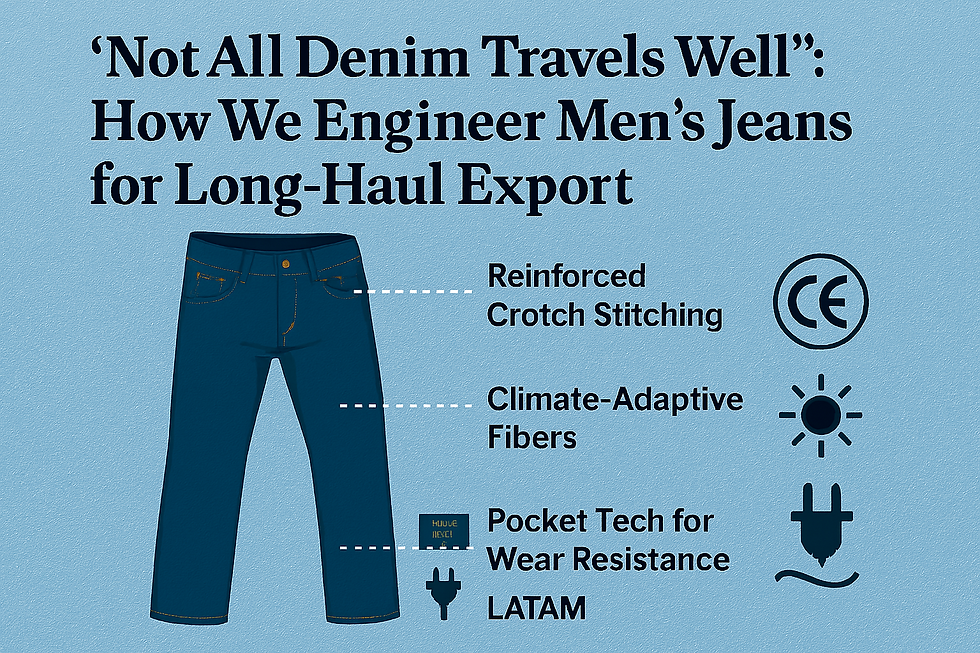Is Your Denim Ready for Export? How to Ensure Your Men's Jeans Meet Global Quality Standards
- jlintlco
- Sep 18
- 5 min read

The global denim market, valued at $70 billion in 2024 and projected to reach $95 billion by 2030 (Statista), is a cornerstone of men’s fashion. Men’s jeans, prized for their durability and versatility, are in high demand across North America, Europe, and Asia. For denim manufacturers and suppliers, exporting through B2B platforms like TradeWheel or Alibaba offers access to this lucrative market. However, meeting global quality standards is critical to succeed in international trade, where buyers demand consistency, compliance, and sustainability. This blog explores how to ensure your men’s jeans are export-ready by meeting global quality standards, addressing key challenges, and leveraging opportunities in the competitive e-commerce landscape.
Understanding Global Quality Standards for Men’s Jeans
Exporting men’s jeans requires adherence to international standards that ensure product safety, durability, and market fit. These include ISO 9001 for quality management, ASTM D3776 for fabric weight, and REACH (EU) or CPSIA (U.S.) for chemical safety. Buyers, such as retailers or wholesalers, also expect jeans to meet aesthetic and functional expectations, like consistent sizing, durable stitching, and eco-friendly materials. Failing to comply can lead to rejected shipments, reputational damage, or lost contracts. By aligning with these standards, suppliers like PLAN MULTIPLE COMMODITIES IMPORT & EXPORT (PTY) LTD can position their denim for success in global markets.
Step 1: Ensure Material Quality and Compliance
The foundation of export-ready jeans is high-quality materials. Denim, typically made from cotton or cotton blends, must meet standards for strength, weight, and comfort. For example, ASTM D5034 tests tensile strength to ensure jeans withstand wear, while ISO 6330 evaluates colorfastness to prevent fading. Global buyers also demand compliance with chemical regulations, as dyes and finishes may contain restricted substances like azo dyes (banned in the EU under REACH).
Solution: Source certified materials, such as organic cotton or recycled polyester blends, from trusted suppliers. Conduct third-party testing for chemical safety and fabric durability, providing Material Safety Data Sheets (MSDS) to buyers. Highlight certifications like GOTS (Global Organic Textile Standard) on your TradeWheel profile or website to boost SEO for terms like “organic denim supplier.” For instance, a supplier in South Africa could emphasize sustainable cotton sourcing to appeal to eco-conscious European markets. Regular audits of material suppliers ensure consistency, critical for B2B buyers who prioritize reliability (78% per a 2024 IBISWorld report).
Step 2: Perfect Manufacturing Processes
Quality jeans require precise manufacturing to meet global expectations. Buyers scrutinize stitching (e.g., double-needle for durability), zipper quality, and fit consistency across sizes. Variations in sizing or poor construction, like weak seams, can lead to returns or negative reviews, damaging your brand. Additionally, international markets have specific fit preferences—slim fits dominate in Europe, while relaxed fits are popular in the U.S.
Solution: Implement strict quality control during production. Use automated cutting and sewing machines to ensure precision, and conduct random inspections for stitch strength and fit accuracy. Adhere to ISO 3758 for care labeling to meet global requirements. Offer customizable options, like tailored fits or branded rivets, to attract B2B buyers like retailers. Optimize your TradeWheel listings with detailed specifications (e.g., “12 oz organic denim, slim fit”) to rank for searches like “men’s jeans exporter.” Training workers on global standards ensures consistency, while showcasing manufacturing expertise online builds trust.
Step 3: Prioritize Sustainability and Ethical Practices
Sustainability is a game-changer in denim exports. The fashion industry accounts for 10% of global carbon emissions (UN Environment Programme), and buyers increasingly demand eco-friendly products. Water-intensive denim production and chemical-heavy dyeing processes are under scrutiny, especially in markets like Europe, where 2024 sustainability directives mandate transparency. Ethical labor practices are also critical, as buyers avoid suppliers linked to exploitative conditions.
Solution: Adopt sustainable practices, such as waterless dyeing or laser distressing, which reduces water use by up to 60% (Textile Exchange, 2023). Source recycled denim or use eco-friendly dyes certified by bluesign. Obtain ethical certifications like SA8000 for fair labor practices and share them on your website or TradeWheel profile, targeting SEO for “sustainable denim supplier.” Offer transparency via blockchain to trace materials from farm to factory, appealing to buyers searching for “ethical men’s jeans exporter.” For example, a South African supplier could highlight partnerships with local organic cotton farms to attract eco-conscious buyers.
Step 4: Optimize Logistics for Global Delivery
Exporting jeans involves complex logistics, from bulk packaging to international shipping. Delays or damaged goods can disrupt retail supply chains, costing buyers millions. Customs regulations, such as tariff codes (HS 6203.42 for men’s denim trousers), and packaging requirements (e.g., moisture-resistant wrapping) vary by market. High shipping costs for heavy denim also challenge competitiveness.
Solution: Partner with reliable freight forwarders like DHL or FedEx, experienced in textile exports. Use vacuum-sealed or eco-friendly packaging to reduce costs and appeal to sustainability-focused buyers. Automate customs documentation with digital tools to avoid delays, and offer flexible Incoterms (e.g., FOB, CIF) to suit buyer needs. Highlight logistics reliability on TradeWheel, targeting keywords like “men’s jeans exporter fast delivery.” Regional warehousing in key markets like the U.S. or EU can cut lead times, enhancing buyer satisfaction. A 2024 McKinsey report notes that 80% of B2B buyers prioritize timely delivery, making logistics a critical focus.
Step 5: Build a Strong Digital Presence
Online marketplaces are crowded, with suppliers from Bangladesh, China, and Turkey dominating platforms like TradeWheel. Standing out requires a robust digital strategy. Buyers search for specific terms like “organic men’s jeans supplier” or “custom denim exporter,” making SEO essential.
Solution: Optimize your TradeWheel or Alibaba profile with keyword-rich descriptions, such as “GOTS-certified slim-fit men’s jeans.” Use high-quality images and 3D visualizations to showcase fits and finishes. Publish blogs on topics like “Why Choose Sustainable Denim?” to drive organic traffic, as content marketing boosts conversions by 20% (HubSpot, 2024). Leverage LinkedIn to network with retailers and share case studies of successful exports. Paid ads on Google or TradeWheel can target high-intent B2B buyers. For example, a supplier like PLAN MULTIPLE COMMODITIES IMPORT & EXPORT (PTY) LTD could emphasize South African craftsmanship to rank for “denim exporter Africa.”
Challenges and Opportunities
Exporting denim faces challenges like fluctuating cotton prices, stringent regulations, and competition from low-cost suppliers. However, these create opportunities. Sustainable practices attract premium buyers, while certifications open high-value markets like the EU. Digital tools streamline operations, and SEO strategies targeting “eco-friendly men’s jeans supplier” drive visibility in a $70 billion market. Localized marketing, such as highlighting slim-fit jeans for Europe, can boost sales.
Conclusion
Preparing your men’s jeans for export requires meeting global quality standards through certified materials, precise manufacturing, sustainable practices, efficient logistics, and a strong digital presence. By addressing these areas, your denim business can thrive on platforms like TradeWheel, connecting with retailers and wholesalers worldwide. Suppliers like PLAN MULTIPLE COMMODITIES IMPORT & EXPORT (PTY) LTD can leverage their expertise to capture growing demand. With the right preparation, your jeans can meet the expectations of global buyers and drive success in the competitive denim market.






Comments